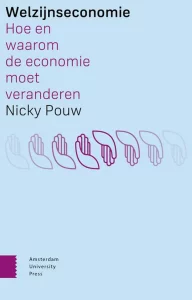Methodology
How and why the economy should change
The Wellbeing Dashboard stems from the theory of wellbeing economics and a corresponding conceptual framework from the book ‘Wellbeing Economics: How and Why Economics Must Change’ by Dr Nicky Pouw. This framework forms the logic of the Index. It puts human well-being at the centre and recognises the intertwining of objective and subjective values (Pouw, 2020).
The development of the Wellbeing Dashboard is described here using the Venserpolder neighbourhood as an example.

Bottom-up: Expertise residents is key
The Wellbeing Dashboard Venserpolder was developed through a bottom-up process in which the expertise of residents played a key role and existing strengths and networks in the neighbourhood were built on. Local cooperation emerged from the ‘Community Wealth Building’ initiative, which argues that the wellbeing of residents should be central in the local economy (supported by Masterplan Zuidoost). To develop the dashboard, we collaborated with representatives of organisations and residents as local experts. This group of active and engaged residents already had a clear vision for improving wellbeing and the local economy in their neighbourhood. In a process of co-creation, scientists and residents looked at how this vision could be realised and the results made measurable.
Interviews, workshops and
co-creation sessions
Several methods were used in this process. First, 9 interviews were held with representatives of local social organisations and initiatives. This gave us a first impression of what wellbeing means in Venserpolder and what the areas for improvement are.
As a second step, workshops were organised in which local experts determined what economic and wellbeing spects are important in Venserpolder and what the priorities are.
We then worked together to examine how to measure these aspects and what a corresponding dashboard should look like.
"The variety of shops is very limited in Venserpolder. For many products I have to walk 20 minutes."
Questionnaires
Based on the identified priorities, questionnaires were prepared that were used to collect data on a large scale. Researchers from the University of Amsterdam personally administered these questionnaires to 279 residents of Venserpolder. This provided both quantitative and qualitative data on wellbeing and the local economy in Venserpolder.
Wellbeing Dashboard Venserpolder
This bottom-up process led to the shaping and completion of the Wellbeing Dashboard Venserpolder. The Dashboard is renewed annually to keep the vision of local residents and the corresponding wellbeing indicators up-to-date. After all, priorities change over time, partly because of what has already been achieved and new challenges that arise.
